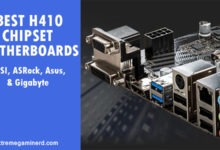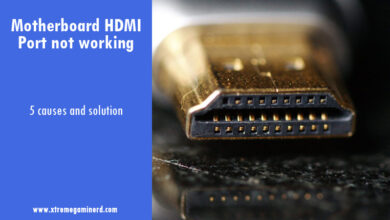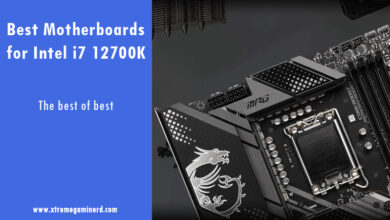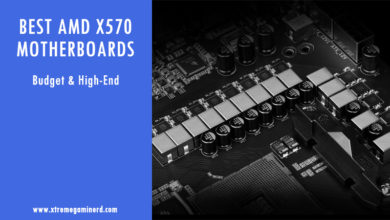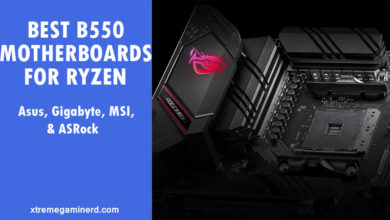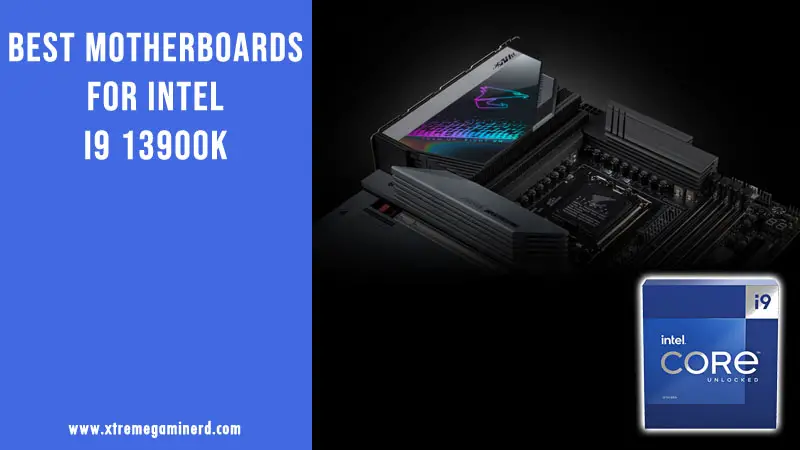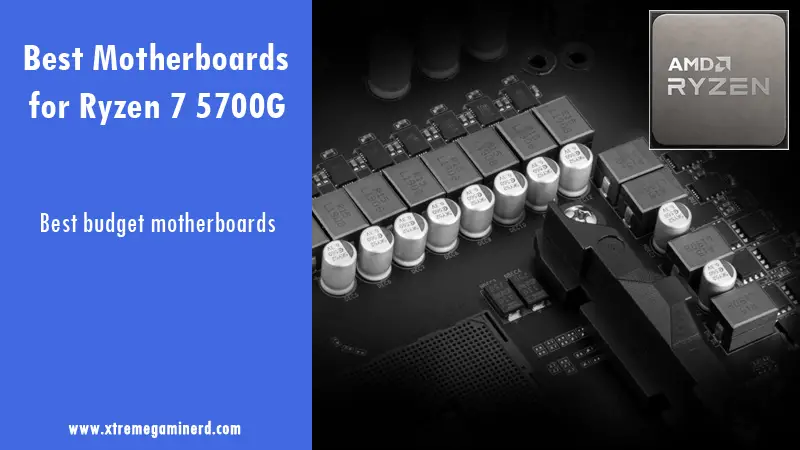
Even though we have several Ryzen 5000 G series APUs, only two of them are currently available for buy. The fastest APU currently is the Ryzen 5700G which features 8 cores and 16 threads that is more than an impressive spec for being an APU.
This makes it not only perfect for multi-tasking but a fantastic entry-level gaming CPU too. It features a base/boost clock speed of 3.8/4.6GHz and the best thing- it can be overclocked. While the older APUs like Ryzen 3200G or 3400G can be overclocked using budget motherboards, Ryzen 5700G has a lot more cores for the motherboard to handle.
For this reason, you should not just pick whatever motherboard you feel looks good from the outside or just because it has got a lot of positive reviews. A good overclocking motherboard should feature a good number of power phases and quality components. Moreover, there should be enough ports/slots to support multiple peripherals and components at the same time.
If you want to know which motherboards will be the best for Ryzen 5700G, then consider going with any of the below.
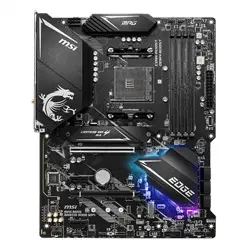
Specifications
- VRM: 12+2 Power Stages
- Memory: 128GB DDR4, 5100MHz
- Expansion Slots: 2x PCI-E x16, 2x PCI-E x1
- Storage: 6x SATA, 2x M.2
- I/O: Total USB ports- 6, Intel Wifi 6 AX200, 2.5G LAN, 6x Audio jacks, Bios Flashback
MSI brings the most varieties in every chipset. MSI has multiple series like MEG, MAG, MPG etc. for different budgets. The MPG category is one of the affordable series that features good value specs without breaking the bank. Here in this particular series, MPG B550 Gaming Edge Wifi is currently one of the best budget value B550 motherboards.
The reason is its 14 power phase VRM each of which is able to handle up to 60A of current. The heatsinks over them are just fine, not too good but should be able to control the temperature with an intermediate level of overclocking. It has a total of 8x fan headers including CPU and AIO headers that makes it perfect for installing multiple fans without any need for a fan hub.
For troubleshooting, it comes with EZ Debug LEDs that most motherboards from other manufacturers lack and this is very helpful when the system doesn’t boot. Also, at the I/O, there is a dedicated USB port and button for BIOS flashback. Unfortunately, there aren’t as many USB ports for connecting a lot of peripherals but it does feature an Inbuilt Wifi 6 adapter and a fast 2.5G LAN without much increase in the cost.
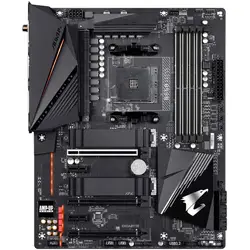
Specifications
- VRM: 12+2 Power Stages
- Memory: 128GB DDR4, 5200MHz
- Expansion Slots: 3x PCI-E x16, 2x PCI-E x1
- Storage: 6x SATA, 2x M.2
- I/O: Total USB ports- 12, Intel Dual Band 802.11AC WiFi, 2.5G LAN, 6x Audio jacks, Bios Flashback
Gigabyte’s B550 Aorus Pro AC is baddest B550 motherboard available. This is not the most expensive but still the best value motherboard for its price. It has a strong 14 power stage VRM that is cooled by dense aluminium fins that cover the entire VRM area. Over it, is the I/O cover that features a single line of RGB LEDs.
The board excels in everything except for the onboard troubleshooting feature. It can support up to 128GB of RAM with up to 5200MHz of clock speed and features triple PCI-E x16 slots for graphics cards. In between, lie dual PCI-E x1 slots for expansion cards. The good thing is that you won’t be needing any PCI Wifi card as it comes with an inbuilt wifi adapter and a 2.5G LAN for fast speed internet.
At the I/O lies probably the best feature. Unlike most motherboards, it comes with 12x USB ports that are very handy in connecting multiple peripherals at the same time. Also, there is a Bios Flashback button to upgrade BIOS at any time with the use of a USB drive.
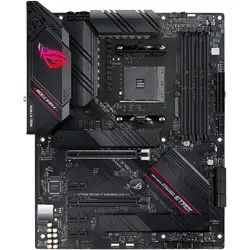
Specifications
- VRM: 12+2 Power Stages
- Memory: 128GB DDR4, 4400MHz
- Expansion Slots: 2x PCI-E x16, 3x PCI-E x1
- Storage: 6x SATA, 2x M.2
- I/O: Total USB ports- 8, Intel Wifi 6, 2.5G LAN, 6x Audio jacks, Bios Flashback
ROG Strix B550-F Gaming Wifi is nearly as good as the Gigabyte Aorus Pro AC. There are some little differences between the two but overall both are best for under $200. The B550-F Gaming Wifi comes with inbuilt wifi 6 adapter and a 2.5G LAN just like the above two motherboards. There is also a Bios Flashback button and USB dedicated to installing the latest Bios version on the I/O.
For overclocking, it features a solid 14 power phase VRM cooled by dense heatsinks. These VRM power stages are capable of handling 50A in each phase. Hence, it is not as good as the Aorus Pro AC but will be sufficient for an intermediate level of overclocking.
The good thing, however, is that it contains Asus Q-LEDs for troubleshooting. These are the same as on MSI motherboards which are known as EZ Debug LEDs. These are absent on the Aorus Pro AC and therefore, this board does have one advantage over the Gigabyte board. Other features are up to the expectations and make it an ideal board for Ryzen 5700G.
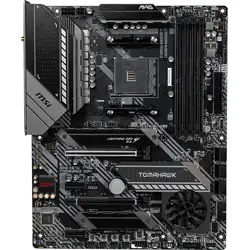
Specifications
- VRM: 12+2 Power Stages
- Memory: 128GB DDR4, 4600MHz
- Expansion Slots: 2x PCI-E x16, 2x PCI-E x1
- Storage: 6x SATA, 2x M.2
- I/O: Total USB ports- 8, 1x PS/2, Intel Wifi 6, 2.5G LAN, 6x Audio jacks, Bios Flashback
The MAG X570 Tomahawk Wifi is a fantastic motherboard that is the most perfect for Ryzen 5700G considering the requirements and cost. It has a solid 14 power phase VRM where each power stage can handle up to 60A of current making a total of 840A in total. It is very much capable of strong level of overclocking and falls just below the enthusiast-level motherboards.
As compared to the B550 chipset, this X570 is way better in components compatibility and features dual PCI-E x16 Gen 4 slots that support higher bandwidth. For storage, there are 6x SATA ports and dual M.2 connectors whereas, for peripheral connectivity, there are a total of 8x USB ports including a Type C and dedicated Bios USB port.
It also features Inbuilt Wifi 6 adapter and a 2.5G LAN for fast speed internet. And for troubleshooting, it is equipped with EZ Debug LEDs just like every other MSI motherboard that is a great addition. For those who own a PC case with a front panel USB Type C connector, then there is good news for them as it features a Type C header too.
The only thing which I believe it lacks for its price is onboard Power/Reset buttons which would have helped a lot in advanced overclocking.
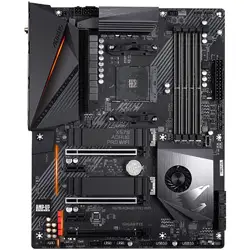
Specifications
- VRM: 12+2 Power Stages
- Memory: 128GB DDR4, 5100MHz
- Expansion Slots: 3x PCI-E x16, 2x PCI-E x1
- Storage: 6x SATA, 2x M.2
- I/O: Total USB ports- 10, Intel Wifi 6, 1G LAN, 6x Audio jacks
X570 Aorus Pro Wifi is very similar in design with the B550 Aorus Pro AC but the VRM is somewhat different. The components are different although both feature 14 power stages. Here the X570 board is rated at 40A at each power stage which is lower than the Aorus Pro AC but as the components are from different companies, X570 is still as good as the other mid-end X570 boards. In my opinion, it is good for overclocking after MSI’s X570 Tomahawk Wifi.
Moreover, its design is fantastic with additional decoration. Unlike most motherboards, it has a quality fin array aluminium heatsinks over the VRM along with a grooved one. Both the M.2 connectors also use a heatsink and the first two PCI-E x16 slots use steel armour for more strength.
At the I/O, it comes with 10x USB ports, an inbuilt Wifi adapter and a LAN port that supports 1GbE of bandwidth. In case, you want a better overclocker and better components, then you may go with the X570 Aorus Master which will cost you $100 more but provides uncompromised performance for a processor like Ryzen 5700G.
Wrapping up!
The list of boards can extend easily and there are a couple of more boards I would like to list here. But it will only produce confusion. These motherboards provide great value for money and hardly exceed $260. Spending over $300 will also be fine if you want onboard troubleshooting features and want to go hardcore for overclocking.
If you don’t need all of these, then you are good to go with any of the above motherboard. In case you need any assistance, drop a comment down below.
